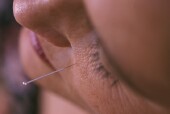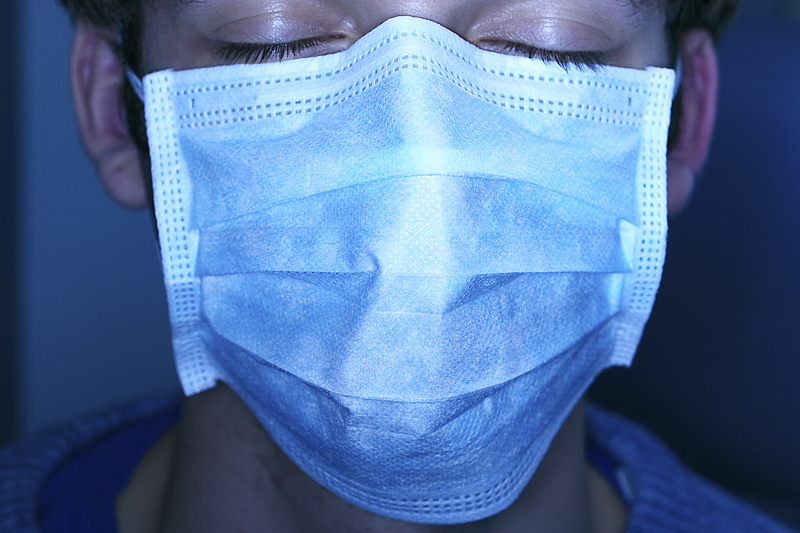
MONDAY, Feb. 18 (HealthDay News) — Hay fever sufferers may find some relief with acupuncture, a new study suggests, though the therapy’s appeal in the “real world” is yet to be seen.
The study, of 422 people with grass and pollen allergies, found that those randomly assigned to a dozen acupuncture sessions fared better than patients who did not receive the procedure.
On average, they reported greater symptom improvements and were able to use less antihistamine medication over eight weeks. The advantage, however, was gone after another eight weeks, according to findings reported in the Feb. 19 issue of the Annals of Internal Medicine.
Still, that doesn’t necessarily mean that acupuncture’s benefits fade, said lead researcher Dr. Benno Brinkhaus, of Charite-University Medical Center in Berlin.
Hay fever symptoms were much better in all three study groups by week 16, and Brinkhaus said that’s probably because pollen season was dying down at that point.
The study was well done and “positive,” because acupuncture seemed helpful, said Dr. Harold Nelson, an allergist at National Jewish Health, a Denver hospital that specializes in respiratory diseases.
But Nelson doubted whether the time, inconvenience and expense of acupuncture sessions would seem worthwhile to many hay fever sufferers — especially because there are simpler ways to manage the condition.
“I don’t know how many people will want to wait in an acupuncturist’s office, then sit with 16 needles in them for 20 minutes, and do that 12 times, when they could use a nasal spray,” Nelson said.
Specifically, Nelson pointed to prescription nasal sprays that contain anti-inflammatory corticosteroids. The sprays — which include brand names like Flonase and Nasonex — are taken daily to help prevent hay fever symptoms.
Patients in this study were not using nasal steroids. They were taking antihistamines as needed — which, Nelson said, is not the most effective way to manage hay fever.
Still, Nelson added, there are people who want to avoid medication, and they may be interested in acupuncture as an option.
Many studies have suggested that acupuncture helps ease various types of pain, such as migraines and backaches, as well as treat nausea and vomiting related to surgery or chemotherapy. According to traditional Chinese medicine, acupuncture works by stimulating certain points on the skin believed to affect the flow of energy, or “qi” (pronounced “chee”), through the body.
But some recent research suggests that the needle stimulation also triggers the release of pain- and inflammation-fighting chemicals in the body. No one is sure why acupuncture would help with hay fever, but there is evidence that it curbs inflammatory immune-system substances involved in allergic reactions.
For the new study, Brinkhaus and colleagues recruited 422 adults with hay fever. They randomly assigned the patients to one of three groups: one that received 12 acupuncture sessions over eight weeks; one that received a “sham” version of acupuncture; and one that received no acupuncture.
In the sham version, acupuncturists used real needles, but inserted them only superficially and into areas of the skin that are not traditional acupuncture points. Patients in all three groups were allowed to take antihistamine medication when their symptoms flared up.
After eight weeks, the study found, patients given real acupuncture reported more symptom improvement than those in either of the comparison groups. On average, their quality-of-life “scores” were 0.5 to 0.7 points better — which, in real life, should translate to a noticeable difference in hay fever symptoms, according to Nelson.
Brinkhaus, who is a medical doctor and acupuncturist, said he would recommend acupuncture to patients who are not satisfied with allergy medication — either because it’s not working or because of the side effects.
Dr. Remy Coeytaux, who co-wrote an editorial published with the study, agreed that acupuncture is worth a shot.
“Absolutely, give it a try if you are interested,” said Coeytaux, an associate professor of community and family medicine at Duke University School of Medicine, who studies acupuncture.
According to Coeytaux, one of the strengths of this study is that it compared acupuncture against both antihistamines alone and sham acupuncture. The fake procedure was used to help control for the “placebo effect” — where people feel better after receiving a treatment just because they believe it will work.
But Coeytaux said it’s also time for studies to move beyond testing real acupuncture against sham versions. One reason is that those fake procedures may actually have physiological effects of their own — making them poor placebos.
Instead, Coeytaux said, it may be time for more studies that compare acupuncture head-to-head with other therapies, to see how it stacks up.
For now, hay fever sufferers who want to try acupuncture may face some obstacles. Depending on where you live, there may not be many licensed acupuncturists nearby; in the United States, most states require practitioners to be licensed.
Then there is the cost. Acupuncture prices vary, but they typically run around $100 for a session, and health plans often do not cover it.
Nelson added that people who want a “natural” remedy for their hay fever woes might also consider allergy shots. That means getting a series of injections that expose you to tiny amounts of the substance causing your allergies, to train your immune system to tolerate it.
More information
Learn more about hay fever from the American Academy of Allergy, Asthma and Immunology.

